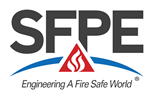FEMTC 2022
Modeling The Effect Of Ventilation On Fire-Induced Environment In A Large-Scale Residential Structure 
Dushyant Chaudhari - UL Fire Safety Research Institute (FSRI)
Abstract
This study aims to investigate the ability to accurately predict the impact of a heating, ventilation, and air conditioning (HVAC) system on the fire-induced environment produced from propane-fueled gas burner fires in a large-scale residential structure. A total of 29 experiments were conducted in a purpose-built, ranch-style, two-story residential structure consisting of 3 bedrooms, living-room, dining-room, and kitchen on the first floor and an open plan basement. Experimental conditions such as location of the gas burner, HVAC status (fan on or fan off), and interior door positions (opened or closed) were varied systematically. Measured data includes temperature, gas concentration, and differential pressure.
The experiments were simulated using Fire Dynamics Simulator (FDS) to quantify the capabilities of the current modeling approach. The as-built HVAC network was modeled to validate the HVAC coupled hybrid approach used in FDS for fires in a multi-story residential structure. The designed loss coefficients were adjusted such that they represented the as-built HVAC network and that they predicted HVAC vent flowrates within the experimental uncertainty of the cold-flow measurements performed in accordance with ASTM E779. Additionally, it was found that reasonable simulation of pressure development in the structure and within an enclosed zone requires careful definitions of leakages. Preliminary FDS simulations of the large-scale experiments indicate that predictions of concentrations (oxygen, water vapor, and carbon dioxide) and temperatures inside and outside the fire room within the residential structure are sensitive to the structural details of the built environment, such as leakages and components of the wall. The work will also systematically discuss some important experimental data, other than those measured in these test series, that can be collected in such experiments for better model development.
Presentation
Resources
| Paper | Presentation | ||
|---|---|---|---|
| HTML | HTML | ||
| Resources Archive File (.zip) | |||

